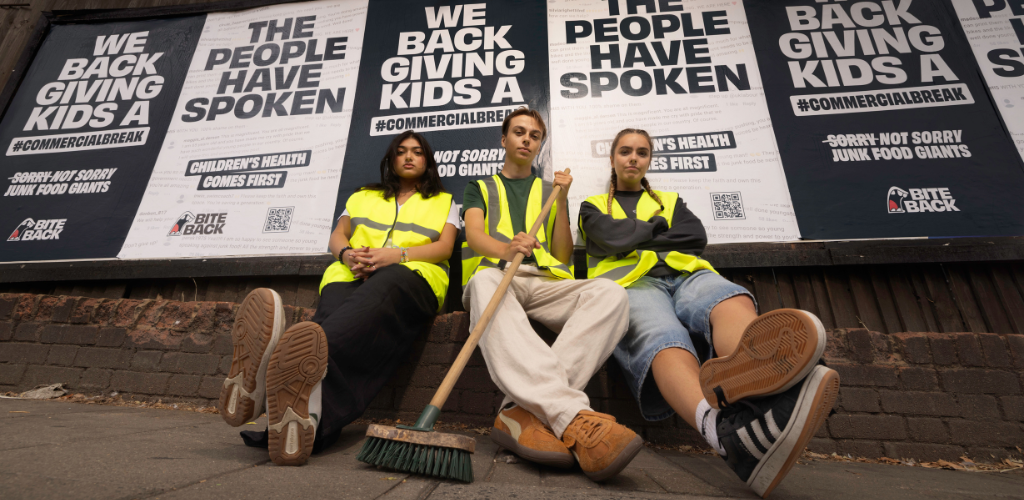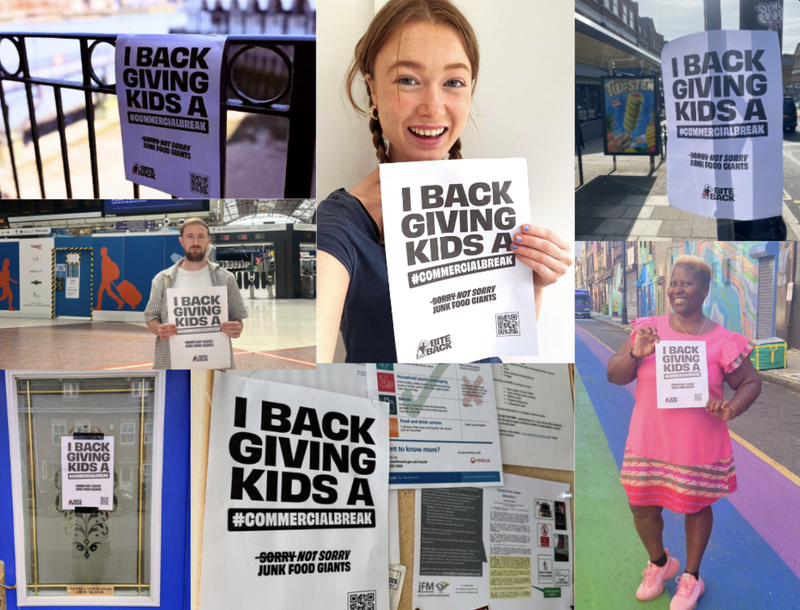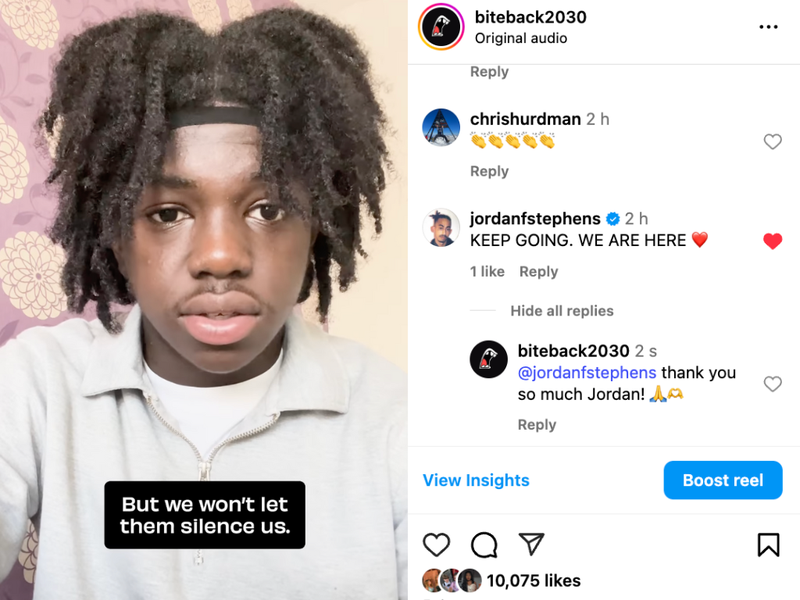The Public Unites To Demand A Commercial Break
21 Aug 2025
The public, celebrities and industry rally behind our #CommercialBreak campaign to take action against junk food ads.

Thousands of people across the UK are backing our youth-led campaign to take down junk food marketing by plastering their homes, shop windows, and community boards with posters bearing messages that faced a ban by major media agencies just a few weeks ago. Our posters carry a powerful message: “Sorry, not sorry, junk food giants — I support giving kids a #CommercialBreak.”
After large media firms, including Global and JCDecuax, refused to carry the youth-designed billboards, citing political sensitivity, our campaign has exploded into a nationwide grassroots movement, with the public stepping in to carry our message forward.

Farid, a youth activist and lead spokesperson for the campaign, said:
“We’ve been overwhelmed by the response. On our social channels, we’ve seen thousands of people engaging and many tagging us with photos of their posters — on windows, balconies, fences and across their neighbourhoods. Several independent media owners and local sports clubs have also shown their support for the movement by donating outdoor media space across the country.
“It’s given us a huge amount of inspiration to keep campaigning. It shows that the public has our back, and that they’re not okay with junk food companies drowning out young people’s voices with their huge marketing budgets. Support matters — because young people’s health matters. It’s time for the Government to follow through and make sure there are no more delays to the ad ban, on TV before 9pm and online.”
We have launched a new public action, calling on members of the public to email their MPs and urge them to pen a letter to Health Secretary, Wes Streeting. The ask is simple: deliver the promised 9pm watershed and online ad ban on junk food — on time and without loopholes, by January 2026.
After months of public campaigning and national media attention, this next phase of #CommercialBreak channels people power directly to those in power. Hit the button below to take action!
76% of the UK Public Want Tougher Junk Food Ad Rules
Our #CommercialBreak campaign, which recently won the Sheila McKechnie Foundation’s award for Best Young Campaigners, has been gaining momentum across every region of the UK.
A new YouGov poll, commissioned by FrameWorks UK for Impact on Urban Health and Bite Back, shows that 76% of UK adults support stronger restrictions on how unhealthy foods are advertised [1] — clear evidence that public opinion is aligned with young campaigners’ demands for change. Among the voices backing the campaign is chef, campaigner and Bite Back founder Jamie Oliver, who said:
“When young people speak up like this, we have to listen. They’re asking for a break from the constant bombardment of junk food, and they’re right. The public clearly understands the problem and backs that change — now it’s time the government listened too. That means not just delivering on their long overdue promise to end junk food adverts aimed at children on TV and online, but also tackling the billboards and posters that surround kids where they live, learn and play.”
While large media firms, including Global and JCDecuax, refused to carry the message, others in the industry are stepping in. Bay Media, a UK-wide outdoor advertising agency, has donated space to the campaign, helping it reach communities from London to Manchester to Sunderland.
In a statement, the company said:
“Bay Media is proud to support Bite Back’s campaign and their work in giving young people a platform to be heard. We believe our media spaces serve an important role in the community, and we’re pleased to use them to help amplify positive public health messages like this one. It’s vital that young people are seen and heard on important issues, and we’re thrilled to help bring this campaign to a wider audience.”
Stellar-cast support
The campaign’s growing support has captured the attention of an array of health experts and cultural figures alike on social media, including Deep Roy, the acclaimed actor known for his roles in iconic fantasy films, rapper Jordan Stephens of Rizzle Kicks fame and Annie Lennox, the legendary musician and humanitarian celebrated for her decades-long commitment to global health and women’s rights.

Katharine Jenner, Director of the Obesity Health Alliance, said: “This campaign makes one thing crystal clear: young people are in step with the public mood — they want action on junk food marketing, and they’re demanding it loud and clear. At the Obesity Health Alliance, we’re proud to stand alongside them. The surge of creativity and support sweeping the country shows this isn’t just a youth concern — it’s a national call to action that must not be ignored.”
Local councils from across the UK are already stepping forward to challenge the junk food advertising status quo. Bedford Borough Council has introduced a robust healthier food advertising policy, becoming one of over 25 English councils to take this decisive action, reflecting widespread recognition that advertising environments shape health disparities.
Similarly, Kingston Council has voted to ban junk food adverts across its public estate, a milestone welcomed by local youth campaigners as a signal of real progress. Meanwhile, the Vale of Glamorgan Council is set to become the first local authority in Wales to restrict junk food advertising in some public spaces.
These local milestones underscore a growing consensus: communities want advertising that supports health. Bite Back now urges the Government to match this momentum with decisive action — honouring its January commitment to deliver the promised junk food advertising restrictions, to close the loopholes on brand advertising, and not let Big Food shift those ads onto the highstreet.
Junk Food Ads Hit The Poorest Communities The Hardest
Latest research from Bite Back and the University of Liverpool highlights the stark inequalities driving this issue. Nearly half (44%) of all outdoor ads in the areas studied were for food and drink. Of those, 57% promoted high fat, sugar and/or salt (HFSS) products, and fast food brands dominated the space — with McDonald’s responsible for 31% of all food and drink adverts recorded. In the most disadvantaged areas, junk food ads appeared at six times the rate seen in the most affluent neighbourhoods.
The full Bite Back report, with the policy recommendations, can be found here.
For more information, interview opportunities, videos and photography:
Henry Makiwa (henry.makiwa@biteback2030.com / 07523681057) and/or Lola Campbell (lola.campbell@biteback2030.com / 07038603389)